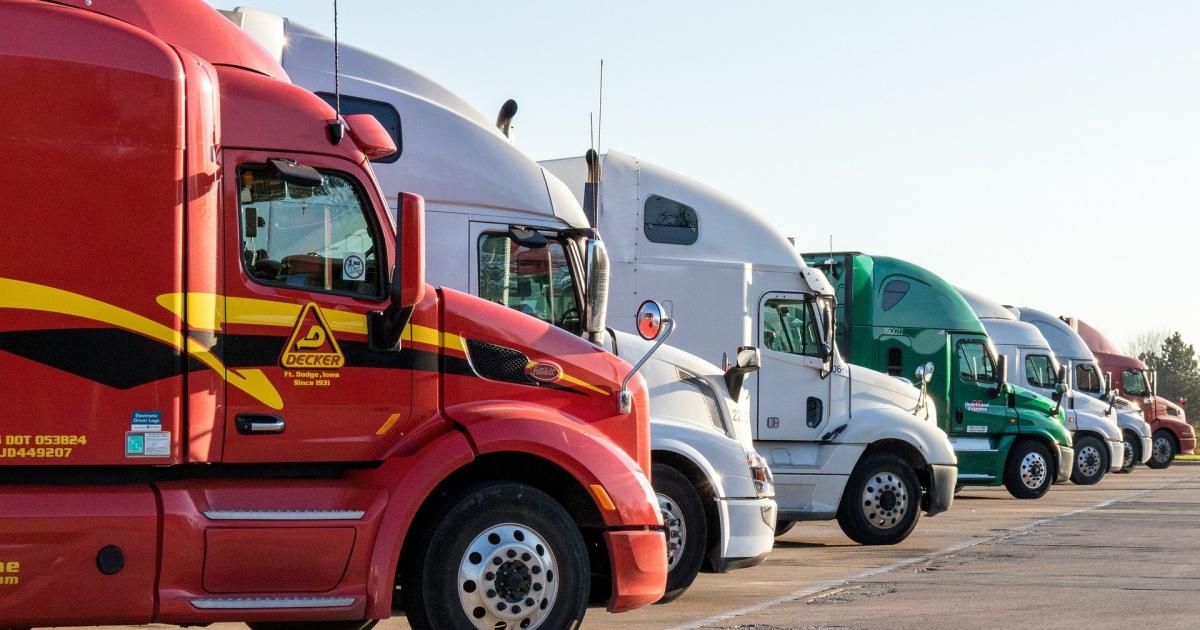Trucks idling in lines to check in at distribution centers due to inefficient yard operations have no place in the “yard of the future,” Andrew Smith, CEO and founder of Outrider, told FreightWaves.
In this future yard, electric trucks autonomously and efficiently reshuffle and move trailers from one place to another.
A customer 3,000 miles away from the distribution center can enter information on a website to direct an autonomous truck to move trailer No. 8 in parking spot No. 32 to trailer bay No. 5.
Outrider’s automated electric yard trucks can autonomously navigate in the yard, back up to a trailer, hitch to it, connect to the airline to release the brakes, move the trailer, safely dock it and unhitch it, leaving the truck ready for its next move.
This autonomous yard operation system features management software, the electric truck itself and the basic infrastructure that allows the vehicle to operate in the yard. Outrider purchases electric trucks from a third party and equips them with computing power, sensors and a robotic arm to give each truck autonomous abilities, Smith said.
Outrider’s electric vehicles (EVs) do not rely on teleoperations. Smith said they are fully autonomous, although the company can monitor and assist vehicles remotely if needed.
Smith founded Outrider in 2017 “to accelerate the deployment of zero-emission vehicle technologies and demonstrate the responsible deployment of automation technology in the supply chain.”
His passion for EVs, efficient trucking technology and sustainability began at a young age. Smith said it stems from an appreciation for the outdoors and a belief that it’s possible to make important economic progress without negative environmental impacts.
EVs are not fully zero-emission vehicles when they are charged with electricity from the grid because the grid still relies on fossil fuels to generate power. However, Smith noted that as local electricity grids transition to more renewable energy, the EVs it powers will immediately run cleaner.
“There’s no reason the yard of the future shouldn’t operate with the click of a button and the power of the sun,” Smith said.
Even if the grid relied fully on coal power, these autonomous EVs still have much lower emissions and are more efficient than diesel yard trucks, he said.
When the company was founded, Smith decided not to take the easy route and automate diesel trucks. He wanted to make a positive impact and pioneer autonomous yard operations in a more sustainable way.
“Automating a diesel yard truck is a little bit like strapping an iPhone to a horse and wagon. You can do it, but it would be sort of a crime to encourage a customer to do that,” Smith said.
He said yard automation and electrification is a “huge market opportunity” to reduce waste, enhance efficiency and drive sustainability into the supply chain.
Addressing The Elephants In The Room — Charging And Cost
It’s true — EVs take longer to “fuel up” than diesel trucks, but is that really a problem in the yard?
Not really, according to Smith. Overall, fast charging capabilities and batteries are improving, he said. Outrider’s EVs are now able to run for 21 hours in a day on a two- or three-hour charge.
The automated nature of Outrider’s system opportunistically sends a truck to charge whenever there is downtime. This automatically takes advantage of quiet periods to stagger charging and keeps yard operations moving around the clock.
To sweeten the EV deal, the hazards and inconvenience of on-site diesel refueling disappear. EVs can use the same electric power as the warehouse, and the computer system is more stable running on an EV, according to Smith.
He said with lower maintenance costs and charging that costs “one-third or less” than the price of diesel fuel, the lifetime cost of ownership for an electric yard truck is lower than its diesel counterpart today. The higher upfront costs of EVs could be a larger barrier for smaller companies.
The Yard Of The Future
“It’s been unbelievably invigorating” to watch customers’ attitudes toward automated electric yard operations change over the last five years alone, Smith said.
While long-haul trucking faces battery technology challenges and range anxiety, EVs in yard operations have few downsides today.
Along with Outrider, more yard service and truck providers and Fortune 500 companies have shown interest in and increased unit sales and implementation of electric and autonomous yard assets, according to Smith.
Lazer Spot, a yard management services provider, recently acquired Firefly Transportation Services, an electric spotter truck provider, to fulfill its vision for fleet electrification.
Terminal Investment Corp. entered into two separate partnerships with Volvo Penta and Cummins to create and deploy its first electric terminal tractors.
“There’s widespread recognition that the yard of the future is going to be electric,” Smith said.
Click here for more FreightWaves articles by Alyssa Sporrer.
Related Stories:
Is Amazon getting into the renewable natural gas business?
Salesforce tool expedites direct and indirect emissions accounting
How much carbon does the transportation industry emit annually?
Lazer Spot acquisition: Electric spotter trucks ‘perfect application’ of EVs
Image Sourced from Pixabay





